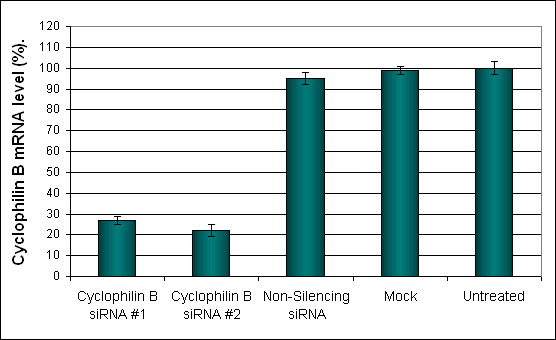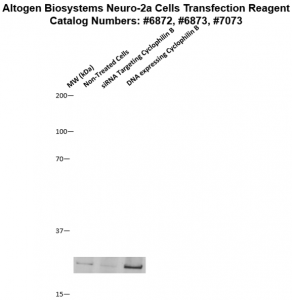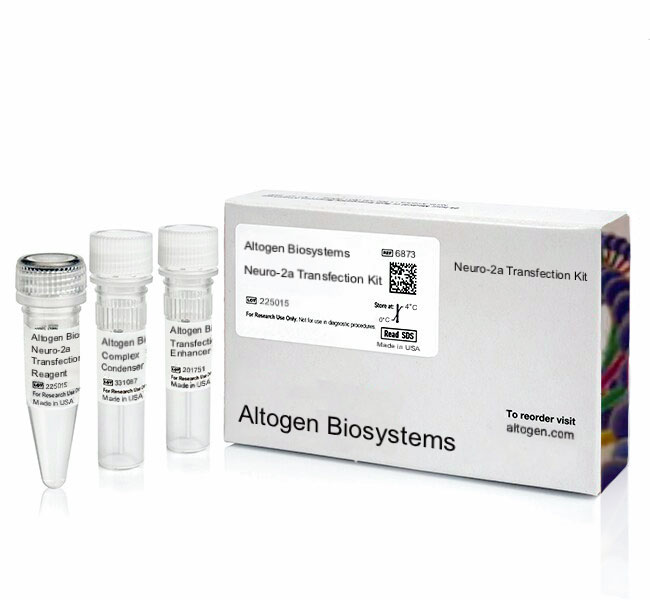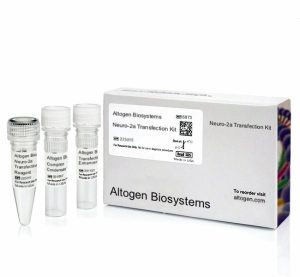Description
Purchase Orders: Click “Add to Cart” button to order, then email PO to orders@altogen.com.
Product Availability: In Stock.
Transfection Reagent for Neuro-2a Cells (Neuroblastoma Cells, CCL-131)
- Proprietary cationic lipids formulation
-
Effective and robust intracellular delivery
-
Kit includes Transfection Enhancer and Complex Condenser reagents
-
Produces consistent results, lot-to-lot, plate-to-plate, and well-to-well
-
A proven reagent for establishing stable cell lines
-
Download in vitro Neuro2a transfection protocol: [PDF]
- Download Neuro2a CRISPR/Cas9 transfection protocol: [PDF]
-
Download PowerPoint presentation for Neuro2a cells transfection kit: [PPT]
- UPC/GTIN/EAN: 860002089792
-
Brand: ALTOGEN®, developed and manufactured by Altogen Biosystems
Transfection Efficiency:
Reagent exhibits at least 71% transfection efficiency of siRNA delivery. Transfection efficiency was determined by RT-PCR.
Product Description:
Transfection reagent developed for Neuro2a cancer cell line and transfection protocol optimized for maximum delivery efficiency.
Transfection Protocol and SDS:
Download Altogen Biosystems Neuro2a Transfection Protocol: [PDF]
Download SDS: [PDF]
Neuro-2a Cell Line:
Neuro-2a (N2a) is a mouse neuroblastoma cell line that was originally derived from a spontaneous tumor in the sympathetic nervous system. This cell line is commonly used in neuroscience research as a model for studying neuronal differentiation, neurobiology, and drug discovery. Neuro2a cells are characterized by their ability to differentiate into neuronal-like cells in response to various stimuli, such as retinoic acid, and by their high expression of neuronal markers, such as the neurofilament protein. These cells also have a deletion in the p53 gene, which encodes for the p53 tumor suppressor protein. N2a cells commonly used to study various aspects of neurobiology, including the mechanisms of neuronal differentiation, the signaling pathways involved in neuronal survival and death, and the development of new therapeutic agents for neurological disorders. This cell line has also been used to study the role of p53 in neurogenesis and to test the efficacy of drugs targeting this pathway. Additionally, N2a cells have been used as a platform for studying neurotoxicity, neuroinflammation, and neurodegenerative diseases, such as Alzheimer’s and Parkinson’s diseases.
Neuroblastoma is the most frequent extracranial solid tumor in children, and roughly half of the patients experience bone metastasis accompanied by bone pain, leading to poor prognosis for those affected. The Neuro-2a cell line was established from brain tissue of an albino house mouse (Mus musculus) with neuroblastoma. These cells exhibit neuronal and amoeboid stem cell morphology, making them uniquely useful for scientific study. Also, the Neuro-2a cell line is susceptible to herpes simplex virus, human poliovirus 1, and vesicular stomatitis virus. Neuro-2a cells have been known to create large amounts of microtubular protein. Neuro-2a cells make for reliable transfection hosts due to their neuronal and amoeboid morphology. Altogen Biosystems offers in vitro transfection reagents delivering satisfactory results, including a liposome formulation Neuro-2a transfection reagent kit for neuroblastoma cells that yields high transfection efficiency and is considered an appropriate host for studying brain tumors.
Data:

Figure 1. Cyclophilin B silencing efficiency was determined by RT-PCR in Neuro2a cells transfected by Cyclophilin B siRNA or non-silencing siRNA control following the recommended transfection protocol. Cyclophilin mRNA expression levels were measured 48 hours post-transfection. 18S rRNA levels were used to normalize the Cyclophilin B data. Values are normalized to untreated sample. Data are presented as means ± SD (n=6).

Figure 2. Protein expression of Cyclophilin B in Neuro-2a cells. DNA plasmid expressing Cyclophilin B or siRNA targeting Cyclophilin B were transfected into Neuro-2a cells following Altogen Biosystems transfection protocol. At 72 hours post-transfection the cells were analyzed by Western Blot for protein expression levels (normalized by total protein, 10 µg of total protein loaded per each well). Untreated cells used as a negative control.
Altogen Biosystems manufacturers over 100 pre-optimized in vitro transfection kits for cancer cell lines and primary cells, elecroporation products, and tissue-targeted in vivo delivery reagents for life science research. Advanced formulation of reagents and optimized transfection protocols provide efficient intracellular delivery of protein, DNA, mRNA, shRNA and siRNA molecules. Read more about transfection technology at Altogen’s Transfection Resource. Altogen Labs provides safety and efficacy preclinical research services. GLP-compliant studies for IND applications, and drug development, including over 90 in-house validated xenograft models, safety toxicology, etc (visit AltogenLabs.com).
Volume Options:
- 0.5 ml (Catalog #6872)
- 1.5 ml (Catalog #6873)
- 1.5 ml CRISPR (Catalog #2184)
- 8.0 ml (Catalog #7073)
Purchase Orders: Click “Add to Cart” button to order, then email PO to orders@altogen.com.
Product Availability: In Stock.






